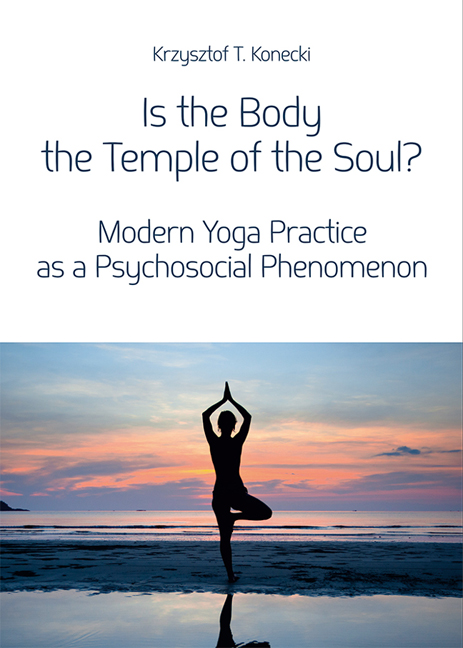Book contents
- Frontmatter
- Contents
- Foreword (Michał Szczepanik)
- Introduction
- Chapter 1 Philosophy and hatha-yoga practice. Para-religious aspects of hatha-yoga
- Chapter 2 The social world of yoga practice
- Chapter 3 Commonsense definitions of yoga and its meaning for practitioners
- Chapter 4 The process of becoming a hatha-yoga practitioner
- Chapter 5 Visual transmission of knowledge and the meaning of corporality and gestures in the social world of yoga practice
- Chapter 6 Emotions and yoga practicing. Working on emotions and achieving “emotional culture” without emotions
- Chapter 7 Teacher and guru in hatha-yoga practice
- Conclusions
- Bibliography
Foreword (Michał Szczepanik)
Published online by Cambridge University Press: 10 January 2018
- Frontmatter
- Contents
- Foreword (Michał Szczepanik)
- Introduction
- Chapter 1 Philosophy and hatha-yoga practice. Para-religious aspects of hatha-yoga
- Chapter 2 The social world of yoga practice
- Chapter 3 Commonsense definitions of yoga and its meaning for practitioners
- Chapter 4 The process of becoming a hatha-yoga practitioner
- Chapter 5 Visual transmission of knowledge and the meaning of corporality and gestures in the social world of yoga practice
- Chapter 6 Emotions and yoga practicing. Working on emotions and achieving “emotional culture” without emotions
- Chapter 7 Teacher and guru in hatha-yoga practice
- Conclusions
- Bibliography
Summary
Yoga is growing in popularity in Poland. As with every fashion, this leads to a number of simplifications, and sometimes even misunder-standings.
Meanwhile, the book by Professor Konecki is a book about yoga in the context of modern culture. It is also a book about modern culture in the context of yoga. It gathers the experience of trainees, and shows as well the phenomenon that evolved out of Indian tradition and became an integral part of Western-European lifestyle.
One may ask: in a world of corporations, business transactions, sports competitions and a lay world which is mistrustful towards everything that does not withstand the trial of rational discussion, is there space for the search for inner peace and harmony? How much does physicality (asana exercises) bind with spirituality? It is worth asking yourself these questions even if you have never set nor intend to set foot on the yoga mat. Maybe it is especially worth asking in a country like Poland, which is so dynamically changing and where the meaning of individual choices is becoming ever more important. Every thought which helps one harmonize the micro-cosmos that every human-being is, as well as consciously influence the macro-cosmos – the way the society functions and the way to treat the world we live in – is very valuable. Yoga, which may be treated as “the everyday life religion” (as described by Professor Konecki), or as a way to keep one's psycho-physical fitness in good shape, or as a chance to build community relationships, or connected with Indian culture, or maybe with the New Age, definitely offers one a chance to take control of his or her life. Even if we start from something as basic as our body, if we fully realize the influence that we have on it, that our body really belongs to us, maybe it will be easier to accommodate other aspects of our lives: conscious decision-making, human relations, and our use of natural resources and of the skills given to us. Is this a utopia? Perhaps, but perhaps too it is an opportunity that we overlook because it gets crushed by life's everyday pressures, and because we run away from difficult confrontations with here-and-now solutions.
- Type
- Chapter
- Information
- Is the Body the Temple of the Soul?Modern Yoga Practice as a Psychosocial Phenomenon, pp. 7 - 8Publisher: Jagiellonian University PressPrint publication year: 2016



